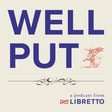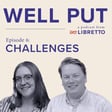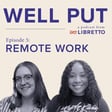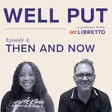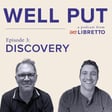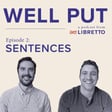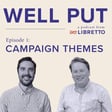Introduction to Well Put Podcast
00:00:13
Speaker
Welcome to Well Put, a podcast about communications for mission-driven organizations from libretto. I'm Connor Ferguson. And I'm Nancy Boissonnais.
Supporting Organizational Changes
00:00:23
Speaker
Today, Connor and I are going to discuss how libretto supports our clients at moments of organizational change.
00:00:30
Speaker
um There are couple different types of change where libretto can be a good partner. One of those is moments of leadership transition,
00:00:41
Speaker
Another is changes of focus in the organization. And finally, any kind of big event like an anniversary or a fundraising campaign.
JVS Boston's Fundraising Initiative
00:00:52
Speaker
As we were thinking through this, we thought about one of our clients who was a particularly important moment in their organization. We were working with JVS Boston, which is a workforce development organization that supports people through job training and education.
00:01:10
Speaker
They originally came to us asking for campaign communications. They were launching a major fundraising initiative and wanted to put together a case for support. We went in and spoke to them. And when we got there, we realized that maybe before they did the case, what they needed was a messaging platform to lay out some of the thinking around why they were doing this campaign, why now, why support JVS, some of that really big foundational language that could be beneficial.
00:01:42
Speaker
They agreed to that and we decided to get started on that project. But pretty quickly as we were involved in the project, we realized that we kind of needed to hit the brakes because one thing that JVS hadn't done in a long time, while they had a really strong mission and really motivated folks on their team, they hadn't spent a lot of time articulating their institutional messages.
00:02:05
Speaker
So one step back from campaign messages, what is JVS? What do they do? Why do they do it? What is their value to their clients?
00:02:18
Speaker
So in collaboration with our clients there, we decided let's start with that institutional messaging platform.
Adapting to Leadership Transitions
00:02:24
Speaker
Then we'll move into ah campaign messaging platform on a strong foundation.
00:02:30
Speaker
And we were really happy to have this happen. This is kind of an ideal case scenario for us. um Connor, I remember you and I just being so thrilled that we were going to be able to take the larger view and start with the organizational messaging. And we could communicate to them how much we thought that was going to help their campaign messaging.
00:02:50
Speaker
Yeah. And it was also really helpful because um this, you know, in addition to being sort of a ah a special moment with this campaign, it did also end up involving some leadership transitions.
00:03:02
Speaker
um So their chief development officer who was leading the campaign was relatively new to the organization when we started the project. And so this process of going through the creation of and organizational messaging platform that really came up with the the foundational ideas behind who JVS is and what they do was incredibly helpful for him as he was you know becoming coming on board with the organization.
00:03:30
Speaker
And then on the other end of things, as the campaign was beginning to launch, it became pretty clear that their very long-time CEO um was getting ready to to leave the position. um And he was just such an incredibly charismatic and dynamic leader who had become so closely associated with JVS as an organization.
00:03:58
Speaker
So it was very helpful for them to have this organizational messaging platform during that period of transition as they moved into new leadership and had to sort of figure out like who were they as an organization apart from Jerry Rubin, their CEO.
00:04:17
Speaker
And you know the fact that we were already on the team and working so closely with them and knew the organization so well, at the point that Jerry announced that he was going to be moving on, we could jump in and help them write some of that communications that needed to surround that transition. So we could you know help out with the letters that announced it. We could help out with the newsletters that addressed where the organization was going
Messaging Strategy Success During Pandemic
00:04:44
Speaker
after him. And that was really ah kind of a hit the ground running moment for us because we could just carry that work through.
00:04:51
Speaker
And so we saw that work really through this incredible arc of organizational messaging, in campaign messaging, campaign communications, which included um you know all of the campaign messaging as well as campaign brochure and a digital piece that could be used to present the campaign.
00:05:14
Speaker
Then we did all of the transitional messaging that went with Jerry's departure And so they had a really incredibly comprehensive communication suite that they could refer back to once this was all behind them.
00:05:26
Speaker
So a really solid foundation that they had not started off with before. Again, incredible ideas, an enormous amount of passion, but to have it all gathered in one place is ah as a messaging document that could be used, referred to, you know, and we always say, we said at their training sessions, and we always say in our training sessions, we never want our messaging documents to stay in a drawer. We always want them to be underlined and dog-eared, and we want them to be on your desk where they're going to get coffee spilled on them.
00:05:57
Speaker
I definitely feel like JBS was an organization that was taking those words to heart and who were yeah absolutely using that for so many different things. Absolutely. Even if they probably didn't literally dog-ear them and get coffee stains on them because who even prints out messaging documents anymore?
00:06:17
Speaker
But in the metaphorical sense, yes, exactly we want them to be very, very present. And you know again, it's sort of like whether or not the um success of the fundraising aspect of the campaign has anything to say about the success of the approach to the messaging, who knows? We don't want to take too much credit for anything, obviously. um But they were hugely successful in that campaign. they raised i think well they were The goal was $18 million, dollars if I recall, and I think they exceeded that goal.
00:06:49
Speaker
um And they certainly did it faster than they had initially expected um and like during the pandemic too. So that was kind of astonishing as well. So um you know all of this worked out pretty well for them.
00:07:04
Speaker
Yeah. And you know I think it would be interesting just to think a little bit, to think back to that discovery process because it was during the pandemic. So we were we kicked off the project in person and then we moved pretty quickly to an all virtual discovery process.
00:07:25
Speaker
Yeah. And I think at these times that we're thinking about transitional moments in the life of an organization, discovery can be so incredibly valuable, not just for leadership, but also for all of the people who take part in
Future-Focused Theme Development
00:07:42
Speaker
discovery. And at JVS, we really saw that. It was an incredible effort by their entire organization to come together and to be a part of Discovery. And we were able to hear all of these different voices of a lot of people who had been there for a really long time and who had really longstanding understanding of who they were and where they were headed.
00:08:06
Speaker
And then we were able to take that and to create this theme, which was the work ahead. The work ahead, ah theme I really love because it does talk specifically about the idea of workforce development in the name there. And it also is so forward-looking. So, you know, we always love a theme that's forward-looking.
00:08:26
Speaker
This was really the possibility to say, we have this incredible history. We have built on all of the foundations of our organization. And now we are turning and we are looking at what we have to do. What what comes next?
00:08:39
Speaker
Yeah. um I think that if you remember, Connor, we were at JVS in maybe early March, late February of 2020, and they were in an incredibly strong position.
00:08:56
Speaker
And somebody said in one of those meetings, you know, what happens if the floor were to fall out from under you tomorrow? Yeah. Well, and more specifically that that the the a lot of the goals of the campaign and a lot of their strategic goals in the of the organization were based on the fact that the economic climate at the time, there was kind of record low unemployment. And so a lot of the assumptions that they were making from a strategic standpoint as a workforce development organization were based on that reality.
00:09:31
Speaker
And yeah, i remember sitting in a conversation with people and saying, okay, but like what if what if suddenly there is record high unemployment? And lo and behold, like a month and a half later is exactly what happened during the pandemic.
00:09:45
Speaker
Yeah, so it was an incredible change for that organization brought about really sort of from one day to the next. Yeah, and outside their control. Entirely outside of their control.
00:09:58
Speaker
And they had to figure out how to pivot. A ton of programming. They had to really change the focus of their organization overnight.
00:10:08
Speaker
And while that was happening, they needed to find the way to communicate that in a campaign theme that was going to motivate to be part going of something that was of their organization. That was very different than what they had initially planned to be a part of.
00:10:23
Speaker
So that change right there was monumental for them. And it was, for me, it was an incredible opportunity to be a part of that and to watch them pivot and to help them pivot their communications simultaneously.
Partnership with Quincy College
00:10:37
Speaker
Yeah, I think that the organizational messaging that we that we developed during that process was probably very helpful from that standpoint because you know one of the main ideas that we would that we talked about in that messaging, one of the key messages is is talking about the incredible history of the organization and the fact that they had operated in so many different economic climates basically throughout most of the 20th century.
00:11:05
Speaker
And they were really well positioned to weather these different circumstances because they had that sort of organizational institutional expertise and experience.
00:11:17
Speaker
Exactly. um i think that you know then you went on and did some work with them to do naming and messaging for our lab. Right. Yeah. So they they they then um sort of building off of the success of that campaign, they partnered with Quincy College to develop um a pretty unique space in the Back Bay in Boston that was dedicated to um training for people in the healthcare and biomedical career space.
00:11:51
Speaker
um And this very hands-on practical training center, really quite an astonishing um center in terms of the the simulation spaces that they have available there.
00:12:04
Speaker
um And really, it's sort of putting their money where their mouth is as far as that that workforce training, particularly in a sector that is or you know I assume now, but definitely at the time was one of the biggest and fastest growing in terms of demand for new trained employees or even employees who are improving their skills and and um giving themselves better career prospects as a result of new training.
00:12:34
Speaker
And as a result, you know, we look at JVS and we I'm realizing now that they really hit sort of all of those big organizational transition moments. They had a campaign happening. They had a change in focus with our lab and a new direction that they were going in. And they also had...
00:12:51
Speaker
ah leadership change. So we were able to really be with them through a number of transitional moments and that foundational organizational messaging kind of allowed us to keep, hold the course steady, if you will. yeah Through all of that change, there was something to relate back, to refer back to and to say, you know, who are we and who are we going to be in this new moment?
ASFA's Messaging Transformation
00:13:20
Speaker
Great. so that gives so So we've hit all the examples there. So podcast over. Okay, good. We did it all in 10 minutes. um But actually, you know i think that another project that you and I worked on, Nancy, that I think falls into these this category of a moment of transition um is ASFA, the Alabama School of Fine Arts.
00:13:44
Speaker
um This is a publicly funded um school high school in Birmingham, Alabama that is dedicated to the fine arts um and also math and science. So all of their students each of their students has a a specialty, whether that's you know studio art, music, dance, theater, or even math and science.
00:14:07
Speaker
And um it's really quite an extraordinary school because as I mentioned, it's publicly funded. you know It's a state-funded school. um It's not an independent school. it's ah they They don't charge tuition at all.
00:14:21
Speaker
um And their mandate is to serve the entire state of Alabama. So they're also a boarding school. They have boarding facilities there um in Birmingham.
00:14:32
Speaker
And we were brought in on this project um by Dr. Tim Mitchell, who was the incoming president of ASFA. And we had worked with him previously, libretto had worked with him previously at Flint Hill School.
00:14:45
Speaker
And now he was taking on this new role at ASFA. So he was a a sort of familiar quantity to us and vice versa. um But we were all kind of new to ASFA.
00:14:58
Speaker
And so this was one of the ways in which this organizational messaging exercise of developing ah platform of themes and messages and key ideas that could comprehensively represent the school was a great opportunity for him as a leader to first of all get to know this this school. I mean, I think we started this project when he had been there for maybe less than six months or something like that. It was still relatively new in his tenure there.
00:15:31
Speaker
um So our discovery and also the process of refining and getting feedback and input on the messaging platform itself gave him the opportunity to really get to know this place.
00:15:44
Speaker
um But then it also was a moment for him to put his stamp on it and sort of start to execute his vision as the new president of the school. um And it was an incredibly rewarding experience, I think, to be to be part of.
00:16:00
Speaker
And again, so talking about the sort of the the virtual pandemic aspect of things, that was something where we did all of the discovery virtually. We had been working with them for I think over a year before we even set foot in Birmingham to actually meet any of them or see any of the facilities.
00:16:19
Speaker
Which is a real ah change in the approach for us because prior to that, we had always started all of our projects with a site visit. In this case, we couldn't do that. So you know for me going down there, that first time that we went down there, we had already spoken to over 100 members of the community. yeahp And we finally went down to Birmingham and it felt like a homecoming in some ways. felt meeting celebrities.
00:16:47
Speaker
Yeah. We had people who had really become friends and who we felt so close to. And we were able to go down there and see them in action. And I just remember at one of the training sessions we did, we had a dance instructor Do you remember this? We had a dance instructor who we had spoken to on the phone. yes And as part of the messaging workshop, we asked that people get up and share stories about ASFA.
00:17:17
Speaker
And he got up and did dance. Yes, yes. He moved as he said it. Yeah. As he told his story, he accompanied it by dance.
00:17:28
Speaker
And it was just such an incredible moment of all things coming together, that we had had an initial conversation with him via Zoom about the importance of dance. And then we ended up in that room together and he could dance his response to the messaging.
00:17:43
Speaker
um it was It was a really powerful moment. I wish we had like and filmed that or something because i think that's probably the only instance in which we've had somebody give their give their reaction to our work through dance.
00:17:58
Speaker
Yes. Yes. I really do wish we had it on video. It was quite remarkable. i had kind of forgotten about that. I'm glad you remember reminded me of that. That was that was a remarkable moment. And and yeah, it was it did feel like a homecoming. like you sort of All of these places and programs that we had heard so much about and suddenly seeing them in in in person and it's like, oh, this stuff actually exists. It's not just you know not just theoretical.
00:18:28
Speaker
Right, right. And you know that discovery was also fascinating because it was Such a comprehensive discovery process. We spoke with parents, students, alumni, faculty, staff.
00:18:45
Speaker
We also spoke with state legislators. We spoke with community members in the arts organizations in nearby Birmingham. We spoke with members of this theater that is part of ASFA and with members of the the teaching faculty. So two different perspectives there. So we spoke to all of these different people.
00:19:07
Speaker
And for Tim Mitchell, who's the incoming director, i think that really allowed him to learn from our discovery sessions, to get the voices of all of these different community members.
00:19:22
Speaker
And it also helped him to socialize his vision, to have to start having those conversations so that by the time the messaging platform was... produced, it didn't feel like it was coming sort of out of left field, that they were being hit with this new vision.
00:19:39
Speaker
It was really something that felt like a continuum of thought and a continuation of these conversations that had been started as really a community effort to define who the school was and where its value lay.
00:19:52
Speaker
So I think that that um was was a really beneficial piece of this particular discovery process. And the other thing I wanted to mention was the tagline we ended up coming up with.
00:20:04
Speaker
Because there was such a misperception of ASFA being a private school, um you know we started talking about this idea of the public school for the public good. and yeah How that one phrase could help to just shift perception and help people.
00:20:22
Speaker
mean, we're talking about a really big audience here. Help people across the state understand that this might be a viable option for their kids when in the past they didn't think that that was the case.
00:20:34
Speaker
and that it was a school that was a public school, but it was for the public good. So there we're starting to make the case for fundraising, which something that's ongoing at ASFA, but they were really trying to create a program um to engage people alumni to engage community members, to figure out how to communicate to folks that even though we are a public school, we have incredibly broad needs because of the requirements in terms of space, materials, and support.
00:21:10
Speaker
for the kinds of subjects that we teach. So how do we start to transform that message into, hey look, it's a public school, into something that also says, and we can benefit from your support.
00:21:21
Speaker
um So that was part of that process. And um Connor and I were able to speak with Tim pretty recently to hear how they've used the messaging. And I just i was so psyched to have that conversation with him a few years on where they're at.
00:21:38
Speaker
Yes. Yeah. No, he was it was it was so good to hear sort of the way that a that that those elements of the messaging that we had developed were still highly relevant, that they were still making use of them, they were using you know lines from it. and the and in you know they they They bought ad space during the Super Bowl and things like that. you know they They were using all of that in in these very high-profile contexts.
00:22:09
Speaker
And you know it's also helping them build up. You you know you alluded to this a little bit and just a minute ago, Nancy, their fundraising and the idea of moving towards a campaign because you know they they just they didn't have a huge fundraising um operation when we when we started. They didn't have you know a huge base of alumni donors, for instance. And so this idea of public school for the public good is really important not just from an admissions and awareness campaign standpoint, but also from a fundraising perspective because particularly at this stage as they are building up there their development capabilities, building up their their philanthropy,
00:22:58
Speaker
they're going to be turning to a lot of sources of fundraising that are not necessarily people who have already sort of bought in into the whole ASFA ethos. right So you know corporate foundations, for instance, granting organizations, places where they're going to have to make the case not just for the need, but also sort of the value and what what ASFA provides to the state of Alabama.
00:23:25
Speaker
Yep. And it's interesting to think about that and how different that was from the project we did with JVS, for example, where really assigned the mission to do institutional messaging and then campaign messaging.
00:23:37
Speaker
Here we were doing institutional messaging knowing that we needed to have a long view over the creation of a development program. And that this messaging needed to have a lifespan that was going to support that and it needed to set certain foundations for the development messaging for something that really didn't even exist yet, and how to set them up to create something on a strong foundation, and how to sort of be able to do that visioning exercise through the institutional messaging.
00:24:11
Speaker
Yeah, absolutely. Another project that I think is a great example of messaging being put to great use in a moment of transition is um some work that we did a few years ago with Harvard Business School, specifically their doctoral programs.
00:24:27
Speaker
So it's kind of a little bit complicated in terms of the the the technical stuff behind it.
Harvard Business School Program Transition
00:24:34
Speaker
But basically, up until fairly recently, up until the point at which we started working with them, which was I think in 2017,
00:24:43
Speaker
Most of their doctoral programs at HBS were DBAs. That was the degree, a Doctor of Business Administration. um But in reality, the degrees themselves or the programs themselves didn't necessarily reflect or weren't reflected by what degree was actually being granted. Because in fact,
00:25:04
Speaker
the work that their doctoral students were doing um was heavily research-focused. It basically had the same level of rigor and and and intensity as PhD.
00:25:15
Speaker
um For various reasons, the only entity within Harvard University that can grant a PhD is the Faculty of Arts and Sciences. So they needed to basically make a transition where you know These students were enrolled at HBS, but they would receive their degree, their PhD, from the Faculty of Arts and Sciences rather than the DBA that they had been getting before.
00:25:42
Speaker
um And so part of the messaging challenge here was having to position this change not as a change in the actual program, but rather that the degree that was being granted and sort of the bureaucratic structure behind it was being changed in order to better reflect the reality of what these students were actually doing, the rigorous research that they were already taking part in.
00:26:09
Speaker
i think one of the things that was amazing about that project was that we had to talk to a lot of people who – A, didn't necessarily know that this was going to happen, but B, had really strong opinions about it as soon as they found out. And what we needed to do was sort of serve as an intermediary to say, hey, this is what's happening, and then to outline in our conversations what a lot of the benefits would be.
00:26:35
Speaker
So we needed to get feedback from them, but we also needed to get some of that messaging out there. So that required a kind of ah a one-two punch in our approach where we needed to lay out what some of the key themes were in advance of these conversations. So frequently in our process, we use the conversations to ID the themes.
00:26:57
Speaker
In this situation, we needed to ID the themes and then sort of share those themes throughout the conversations and And then get some feedback. So then we used the feedback that we had gotten to help figure out what communications were going to be necessary to share this with a broader community. What do people need to know?
00:27:18
Speaker
How are they likely to feel about it? What would be valuable for them to know about it? And how is it going to impact them? So for some of these folks, the fact that they had gotten a DBA was a point of pride, and their DBA was not going to be retrospectively turned into a PhD. But they felt that it was going to be devalued by the fact that new people were getting a PhD. Right.
00:27:43
Speaker
In other situations, people felt like what they had done was equivalent to a PhD, so theirs should also be retroactively upgraded. So there were a lot of feelings going on, yeah and there was a need to communicate in a way that was...
00:27:57
Speaker
Taking into account all of these feelings, being really clear about what was happening and why it was happening, and always framing it as an advantage to the program moving forward. So the value of their degree was going to be reflected in the value of today's programs at HBS.
00:28:19
Speaker
Right. So for us, it was a little bit of a different process than we normally do, but it was a great example of an organization going through a moment of change and us being able to modulate our process to help them communicate it out, bring people under the tent, make people feel like a part of the process, help them to understand And then we were able to help them as an organization write a series of letters and some ah brochures around what this meant and what it meant for the organization going forward.
00:28:58
Speaker
Yeah. and I think that there's often instances where our discovery conversations have some of that sort of socializing you know political and ah aspect to them where you know it's not just about us gathering information, it's also sometimes about us having sometimes slightly delicate conversations with particular stakeholders in order to help bring them along and make sure that they feel that their voices are being heard.
00:29:31
Speaker
It occurs to me as we're having this conversation that really that could have been the theme of this podcast because in all three of yeah these projects, that was a real differentiator that those discovery conversations were serving a certain purpose and not that purpose was not necessarily for us to gather information.
00:29:52
Speaker
although Or not exclusively for us to gather information. Exclusively, exactly. mm-hmm. I mean, I think another thing that you can take away from looking at these three projects is that, you know, sometimes a moment in an organization that can feel potentially damaging or difficult is,
00:30:15
Speaker
can end up being an incredibly fruitful moment to create new communications. And to really sort of dig into those issues and to work them out together can lead –
00:30:30
Speaker
kind of breakthroughs. I mean, I guess we're back in therapy, but but deciding to dive in and to engage with the issues. So if you think about what JBS went through at the moment that the pandemic hit and the economy crashed, that could have been a real sort of uh-oh moment for them. And instead, it was a moment where they decided to just gather up their forces and really create something incredibly strong.
00:30:55
Speaker
um I think with HBS and the the DBA to PhD transition, that could have been something of a moment of friction for them.
Strategic Communications Importance
00:31:04
Speaker
And it ended up becoming a moment that really rallied their alums and brought a lot of them closer to the organization and got them more involved and um and and really sort of engaged them with the current day programs.
00:31:22
Speaker
Well, because it helped to sort of advertise and and raise awareness of of exactly what is involved in a doctoral program, a doctoral degree at HBS, and this level of of rigorous, intensive research um that is so central to to the program. And you know similarly, I think ASFA is it's a school that is sort of in a maybe it maybe it's not so much of a single moment of transition as it is kind of a long-form transition you know that was part of
00:31:54
Speaker
I guess the theme of our conversation with Dr. Mitchell a couple weeks ago is that you know there's big plans on the horizon for this school and having this foundational messaging that helps them you know, be able to remind themselves who they are, what they're doing and why they're doing it.
00:32:14
Speaker
um It provides sort of a guide. It's a North Star for them as they continue to advance, you know, through capital improvements, potentially through, you know, an increase in fundraising, know,
00:32:29
Speaker
you know possibly increasing enrollment. I don't want to you know sort of give away give away all of Dr. Mitchell's plans here, but you know it's an incredibly exciting um time for them that's less about sort of a single inflection point than it is the beginning of a more gradual and strategic evolution.
00:32:52
Speaker
And that brings up what I think is a really important point and something that I encounter over and over and over again when I'm talking to possible new clients for us, that folks tend to think we'll do a messaging engagement when things have settled down. So either right when this CEO has left and the new one has finally settled in, or when this new program is up and running and we're really able to talk about it, or once we really have the campaign nailed down and we've gotten approval for the board.
00:33:26
Speaker
And almost invariably in those situations, we're When they wait, they end up regretting it because it's then you need to start the discovery process at the point where you want to have something in hand.
00:33:42
Speaker
And it's pretty much universally true in my experience that if you just dive in and get started and you start having some of those discovery process processes,
00:33:53
Speaker
conversations Because of the nature of our process, you'll be able to bring people along with you. You'll be able to actually intentionally make certain changes rather than waiting until the dust settles and those things happen kind of regularly.
00:34:09
Speaker
despite you. um I think that that is a really good takeaway here, that if you feel like something is happening and there's churn, that's not a time to wait. It's actually the opposite. It's a time to get things started and to say, how can we dig into this and what can we learn about the organization and how can we be more intentional about these moments of transition? Yeah.
00:34:33
Speaker
Yeah, that idea of being more intentional I think is really important because if you start too late, if you sort of let let's let the train kind of get out of the station before you really start into the messaging engagement, then some sometimes like the messaging gets driven by so many external factors that are already moving and already in motion.
00:34:54
Speaker
in motion And you don't have the time to sort of stop and say, like well, no, let's do it exactly the way that we want us want to do it. Let's say that exactly the things that we want to say rather than kind of responding and being reactive to the circumstances on the ground.
00:35:12
Speaker
Right. And i I definitely think we see that. I remember being surprised many years ago when I was just a youngin' at libretto how at the lead time that was required for campaign communications in particular.
00:35:29
Speaker
It's a long lead time, but there is a lot that needs to happen before even a quiet phase launch. There are a lot of people who need to get on board. There's a lot of approvals and socialization that needs to happen.
00:35:44
Speaker
And I remember thinking, like, why would we possibly start doing this? two years out from a time when we need a brochure in hand. And now it makes perfect sense having gone through so many campaign processes that you're going to want to have those preliminary conversations. You're going to want to put a prospectus in front of people to say, here's what we're thinking about doing and here's the directions we're thinking about going in.
00:36:08
Speaker
What excites you? Then you get feedback from them. Then you're able to create a messaging platform that actually represents both the organization's ambitions and what the donors are excited about and the board members are excited about so that more people feel more engaged at an earlier stage.
00:36:28
Speaker
So I think that you know you realize then that your moment of transition can be long drawn out moment that doesn't have to be a moment of floundering or waiting. It can really be a moment of construction And um sort of intentionally bringing people in so that more people feel ownership and excitement about what you're
Personal Interests and Conclusion
00:36:52
Speaker
All right. So what are you loving these days, Nancy?
00:37:04
Speaker
all right so um what are you loving these days nancy So I'm not that far in yet, but I have started reading Robin Wall Kimmer's Braiding Sweetgrass, where I feel like everyone and their brother is reading, or maybe everyone and their sister is reading this book right now.
00:37:24
Speaker
ah It just feels like a real balm to everything that's going on in the world. It's also something that has just a really lovely pacing and feels like exactly the sort of slower approach to life that I need right now.
00:37:42
Speaker
And it also is just talking about plants. All of the plants in my yard are covered in snow currently. So that's a really nice thing to get um to get in my mind that spring is eventually going to come.
00:37:57
Speaker
How about you? What you loving these days? um it's it's so It's really dorky, but um right now i am I'm reading a translation of Herodotus' histories. So Herodotus was an ancient Greek historian, sort of basically like in some ways kind of the founder of like history as a as a discipline.
00:38:19
Speaker
um And it's his sort of history of nominally history of the Persian Wars, but he just goes on so many tangents all over the place, always in this sort of like, well, and I heard this from these people here. And you know this and oh, and by the way, this this ornamental tripod that was given by this king the the people, the temple at Delphi is still there. I've seen it. you know um And it it's actually really entertaining. And the translation, which is um by Tom Holland, not Spider-Man Tom Holland, different Tom Holland. That would have really been something to put on his resume. That would have been. Yes, exactly. um it's it's actually It's really good and it's very conversational and and readable. And
00:39:07
Speaker
And they the introduction is actually very interesting because it describes Herodotus as sort of like the first hyperlinked narrative. like and And it really is kind of like reading like like starting to read Wikipedia because you just you start reading one thing and you're and then it's it's sort of like there comes a moment where he's like, oh, but let me tell you how this king came to power. And then there's like five pages more of just this somewhat unrelated story. And then he's kind of like, all right, now back to what I was saying before.
00:39:39
Speaker
um And yeah, it's kind of like falling down a Wikipedia rabbit hole. So yeah. But in the nerdiest way possible. In the nerdiest way possible. And so like oftentimes with these sorts of by my weird classics obsessions and and you know foreign language stuff, I kind of will couch it and saying, like it's not for everybody. But actually, I would almost say, like hey, give it a try. like Even if you're not somebody who likes reading, you're – sure
00:40:09
Speaker
ah time youre' I'm just going to be honest with you. I'm not going to give it a try, Connor, but I do like hearing you talk about it. I'm not talking to you, Nancy. To anybody else, I might say give it a try, maybe.
00:40:22
Speaker
Maybe you'll find it interesting. um And maybe if you need extra incentive, just pretend that it actually was translated by Tom Holland of Spider-Man fame rather than the unrelated Tom Holland who is presumably- classic scholar. A classic scholar who dresses in tweed.
00:40:40
Speaker
I don't know. I don't have anything against it. Anyway. Okay. All right. Well, it's been fun to ah talk about moments of transition and um Yeah, I was particularly happy to revisit some of those projects that we really loved.
00:40:59
Speaker
Yeah, yeah. it is It is fun to sort of reflect back on what actually made these projects so enjoyable for us, you know, because sometimes it's it's um sometimes when you're in the thick of it, you're not really aware of like, why am I why am i so engaged in this? Why is this so engaging and fun? And Not to suggest that you know other projects are not engaging, but these ones were particularly ah particularly interesting for us, I think.
00:41:28
Speaker
Agreed. Well, this has been Well Put, a libretto podcast. I'm Connor Ferguson. And I'm Nancy Boissanet. If you want to learn more about libretto and what we do, check out libretto-inc.com. Put.

